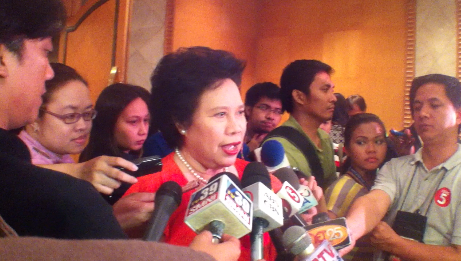SUMMARY
This is AI generated summarization, which may have errors. For context, always refer to the full article.

MANILA, Philippines – Senator Miriam Defensor Santiago thinks the sheer number of nominations for the Chief Justice position is laughable.
After a speech at the Credit Management Association of the Philippines (CMAP), Santiago criticized the process of selection before the press, adding that too many people wanted to be Chief Justice.
She also expressed displeasure at the Judicial Bar Council (JBC), which is responsible for creating a shortlist of nominees for the position.
“I think they should turn that power to the Senate as they do in the United States,” said Santiago. “We’ve experimented enough with the JBC that we have to abolish it in the next Constitution.”
Politicized process
The JBC, Santiago said, was created in the 1987 Constitution to prevent politics from penetrating the screening of judicial nominees, which she said it has failed to fulfill.
Before the 1987 Constitution, both Congress and the Senate were responsible for the selection process.
According to Santiago, because the process has been politicized anyway, the Constitution should be amended to give the sole screening power to the Senate.
To date, there are 66 nominees and applicants for the chief justice position, the most there has ever been in Philippine history.
“This is an avalanche of nominees. I think there should be a weeding out process,” said Santiago.
She also said the JBC’s plan to air live television interviews of the nominees would not help much except to show who’s good in front of the camera, which she said does not correlate with intelligence and would hurt those who are less vibrant on air but may be more qualified.
Santiago herself was nominated for the post, but she declined partly due to her election as a judge to the International Criminal Court (ICC).
In her speech, she bemoaned the lack of qualifications of some of the nominees, and insisted that Philippine leadership “should always be intellectual in nature.”
Defending IMF loan
Santiago’s speech also focused on the Philippines’ $1B loan to the IMF to help European countries facing an economic crisis.
She defended President Benigno Aquino III’s decision saying the Constitution provides the President with sole power to contract foreign loans on behalf of the country.
Santiago also responded to critics who questioned why the Philippines had agreed to lend to the IMF instead of using the money to help the poor.
She explained that the Bangko Sentral ng Pilipinas (BSP) money, or money from investment and miscellaneous income, is separate from national government money, which comes from tax and non-tax revenues.
The BSP, she said, is mandated to maintain international reserves and thus “it is the national government and not the BSP which is directly responsible for addressing poverty with resources coming from the budget.”
She admitted that she does not necessarily agree with the BSP mandate that dictates where BSP money should be used, but assured the public that the loan will not affect the country.
“To allay the fears of our people, let me emphasize that there is no impact whatsoever on the budget allocation of the national government,” she said. – Rappler.com
Click on the links below for more.
- 22 official candidates for Chief Justice
- JBC to interview CJ candidates starting July 24
- 25 accept nominations for chief justice
- Questions for chief justice candidates
- JBC should review process of choosing CJ
- Besides JBC, Palace has judicial search committee
- CONVERSATIONS: How should the JBC choose the next chief justice? #SCWatch
Add a comment
How does this make you feel?
There are no comments yet. Add your comment to start the conversation.